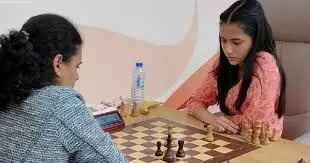Divya Deshmukh Creates History: Wins India’s First Women’s Chess World Cup Title in Batumi
Divya Deshmukh becomes India’s first Women’s Chess World Cup champion, defeating Koneru Humpy in Batumi. A historic win—and a banana that watched it all.
Divya Deshmukh celebrates her historic victory after becoming the first Indian to win the FIDE Women’s Chess World Cup 2025 in Batumi, Georgia.

In a moment that will go down in Indian chess history, Divya Deshmukh, just 19 years old, has become the first Indian woman to win the FIDE Women’s Chess World Cup, defeating veteran Grandmaster Koneru Humpy in a tense final in Batumi, Georgia. And alongside her throughout this milestone journey—remarkably—was a single banana that stayed untouched but ever-present at her side.
A Final to Remember: Deshmukh vs. Humpy
With the scores tied after the classical and initial rapid games, the championship was decided in a nerve-racking rapid tie-break. Playing with the black pieces, Divya was at a natural disadvantage. Yet, she displayed nerves of steel and strategic brilliance as she capitalized on a crucial time-pressure error by Humpy during the 40th move sequence.
Despite both players exchanging errors and flashes of brilliance, Divya held her ground. When Humpy pushed 69.h7, it tilted the game irrevocably. Six moves later, the two-time World Rapid Champion resigned—ushering in a new queen of Indian chess.
A Champion Rises: India’s 88th Grandmaster
Ranked 15th in the tournament and without a single Grandmaster norm before the event, Divya Deshmukh defied all odds. She not only became India’s first Women’s World Cup winner, but also joined the elite league of Indian women Grandmasters including Humpy, D. Harika, and R. Vaishali—doing so in one brilliant sweep, without needing the usual three GM norms.
The Banana That Watched It All
Through every round, every game, and every win, one unexpected companion shared Divya’s table: a banana. The fruit quickly became a quirky symbol of her campaign. When asked about it post-match, Divya said with a smile, “I’m going to eat it—obviously.” Yet, it remained untouched match after match.
Asked if it was lucky, Divya laughed it off: “No!” But, much like Nadal’s water bottles or Dhoni’s glove quirks, her banana became a comforting ritual amid high-stakes play.
An Inspiration for the Nation
Divya's triumph is more than just a personal achievement—it marks a new era for Indian women's chess, inspiring a generation of young players. Her ability to hold her nerve against one of India’s most celebrated players, at twice her age, won hearts across the chess world and beyond.
And while the banana never got its moment, India did—with a new champion, a gold medal, and a memory that will last for generations.

